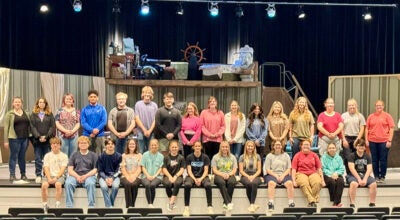Husband: UAH prof went to range before shooting
Published 12:59 am Tuesday, February 16, 2010
HUNTSVILLE (AP) — The husband of an Alabama professor accused of fatally shooting three colleagues said Monday that the couple went to a shooting range recently, but that he didn’t know where she got the gun she used for practice.
His description of Amy Bishop’s “normal” demeanor leading up to Friday’s shooting at a faculty meeting matched an account by a witness, who said the gathering was unremarkable until the gunfire broke out. Bishop, a Harvard-educated neurobiologist, is accused shooting six people at the meeting, three fatally. Two of the survivors remained in critical condition Monday.
Bishop’s husband, James Anderson, said he knew his wife had a gun, but didn’t know when or how she got it.
“I really don’t know how she got it, or where she got it from,” he told The Associated Press in an interview at his home.
Police have previously said Bishop had no permit for the gun they believe she used in the shooting, and investigators said they didn’t know where she got it. It’s not clear if that was the same gun that her husband knew about.
Bishop’s husband said nothing unusual happened on their trip to the shooting range, and that she didn’t reveal why she took an interest in target practice. Nothing in her behavior in the days before the shooting foreshadowed the violence last week, either, he said.
“She was just a normal professor,” he said.
Before the shootings Friday, the meeting was tranquil enough that ecology professor Robert O. Lawton was working on a manuscript about trees instead of paying full attention to the discussion. He said Bishop’s behavior didn’t stand out.
“It was an ordinary faculty meeting. Then it became unordinary,” Lawton said Monday, declining to elaborate on what he saw.
Investigators haven’t commented on a possible motive, but Bishop was vocal among colleagues about her displeasure over being denied tenure by the university, forcing her to look for work elsewhere after this semester.
On Monday, some victims’ relatives were questioning how Bishop was hired at the university in 2003 after she was involved years ago in separate criminal probes. University of Alabama in Huntsville officials were meeting privately to review the files concerning her hiring.
In 1986, Bishop shot and killed her 18-year-old brother with a shotgun at their Braintree, Mass., home. She told police at the time that she had been trying to learn how to use the gun, which her father had bought for protection, when it accidentally discharged.
Authorities released her and said the episode was a tragic accident. She was never charged, though current Braintree police Chief Paul Frazier questions how the investigation was handled. Frazier said she also fired once into a wall before hitting her brother, then fired a third time into the ceiling.
Her husband said Monday he had known about her brother being shot, but said “it was an accident. That’s all I knew about it.”
In another incident, The Boston Globe reported that Bishop and her husband were questioned by investigators looking into a pipe bomb sent to one of Bishop’s colleagues, Dr. Paul Rosenberg, at Children’s Hospital Boston in 1993. The bomb did not go off, and nobody was ever charged.
Anderson defended himself and his wife as innocent people questioned by investigators casting a wide net. He said the case “had a dozen people swept up in this and everybody was a subject, not a suspect.”
“There was never any indictment, arrest, nothing, and then everyone was cleared after five years,” he said.
Huntsville police spokesman Sgt. Mark Roberts said his department didn’t find out about either of the older cases until after the shooting on campus. He said police were checking with law enforcement to confirm details of the pipe bomb probe.
Sylvia Fluckiger, a lab technician who worked with Bishop in the early 1990s, said Bishop had been in a dispute with Rosenberg shortly before the bombs were discovered, though she didn’t know the nature of the disagreement.
“It was common knowledge,” she said Sunday.
It was not clear Monday if UAH spoke with Rosenberg when it hired Bishop, an associate professor whose research led to an innovative cell incubator now being developed for market by a private company, Prodigy Biosystems, that employs her husband.
Sammie Lee Davis, whose wife, Maria Ragland Davis, was killed in the shooting, expressed concern that UAH hired someone with a past like Bishop’s.
“This is all new to us,” he said of her past.
The slain professor’s two stepdaughters said they were shocked that Bishop was hired.
“I think they need to do a little more investigation when coming down to hiring teachers and things like that. Maybe looking a little deeper into their past about certain things. This is a lot coming out … It’s a shocker,” said Melissa Davis on ABC’s “Good Morning America.”
University of Illinois law professor Matthew Finkin said that because Bishop wasn’t charged with a crime before, the fatal shooting and pipe bomb cases would not have shown up on most background investigations.
“I don’t see what the institution (UAH) could have done,” said Finkin, who recently co-wrote a paper on the subject for the American Association of University Professors.
He said there are more extensive and expensive types of background checks that might have turned up those incidents.
“But we normally don’t do those for a reason and a respect for privacy. They are very invasive,” Finkle said. “You can’t function in an atmosphere of suspicion.”
Bishop is charged with one count of capital murder, which can lead to a death sentence in Alabama if convicted, and three counts of attempted murder.
Killed were Gopi K. Podila, the chairman of the Department of Biological Sciences, and professors Adriel Johnson and Davis. Two of the wounded — professor Joseph Leahy and staffer Stephanie Monticciolo — were in critical condition Monday. The third, Luis Cruz-Vera, had been released from the hospital.




